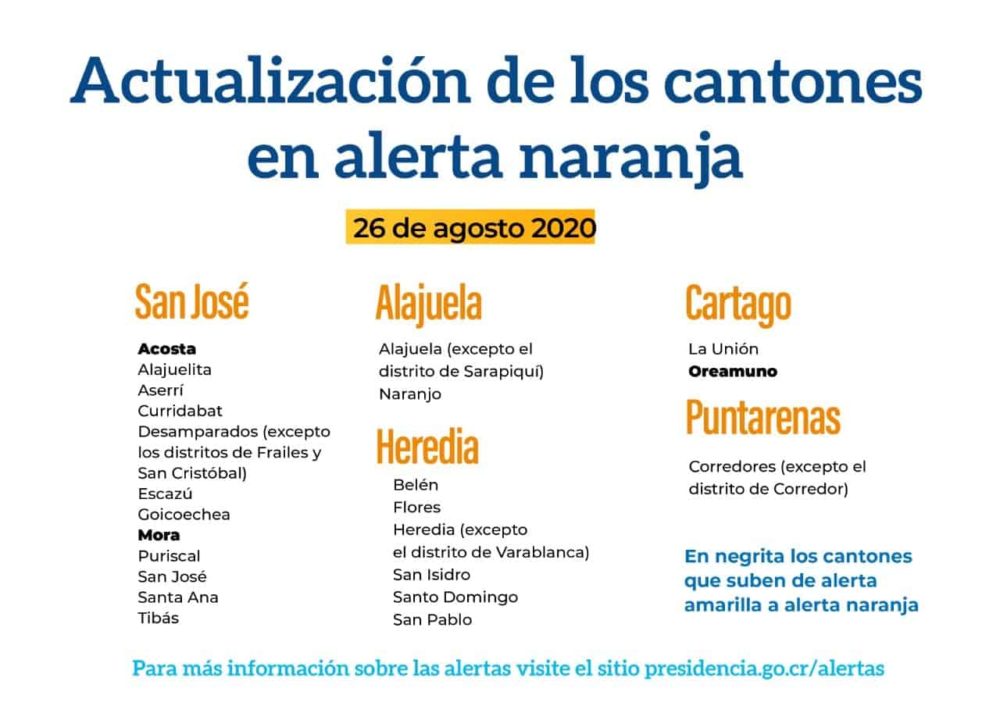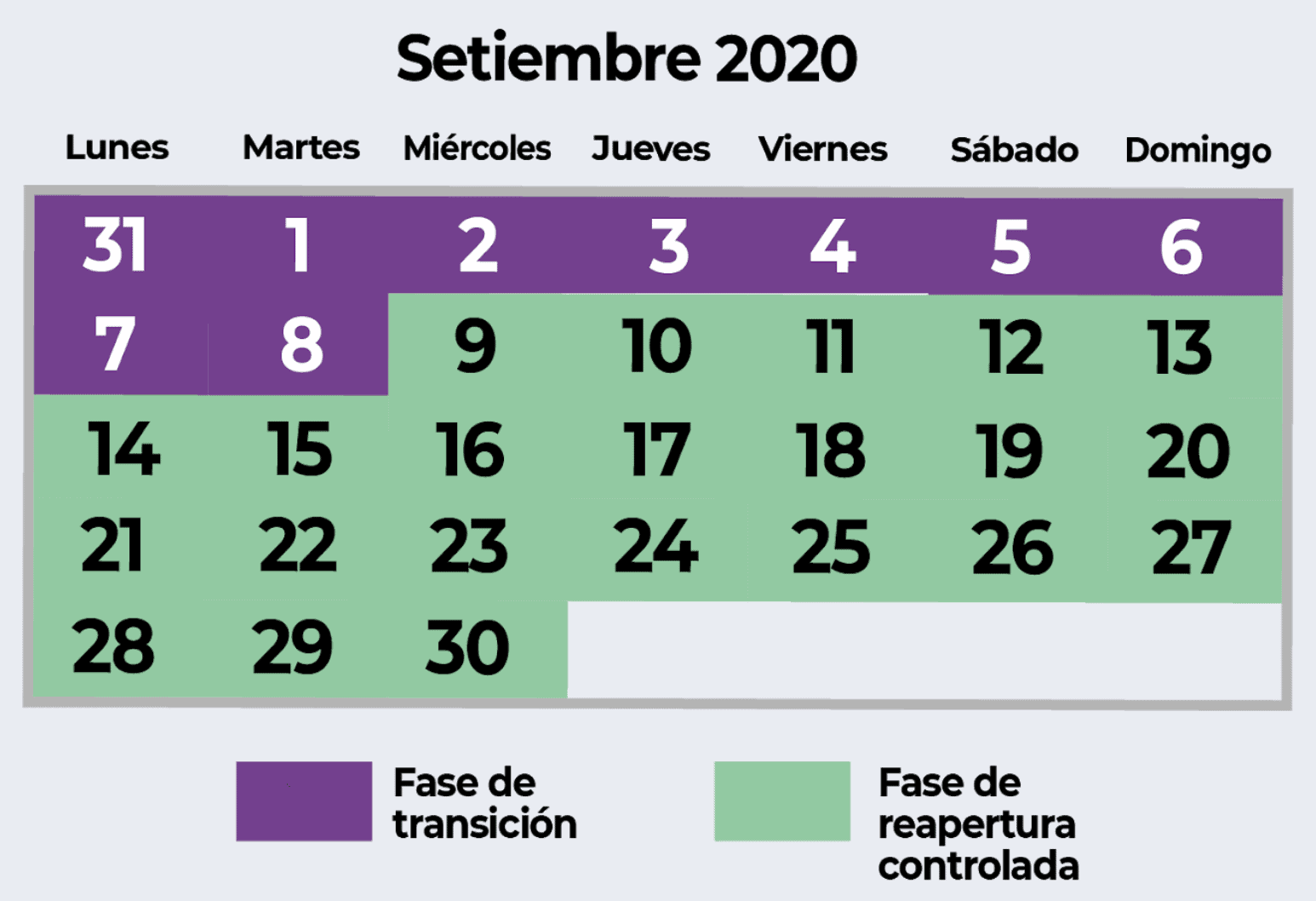President Carlos Alvarado and the National Emergency Commission (CNE) established the following schedule for Costa Rica’s September coronavirus measures.
The following measures applied starting Monday, August 31.
‘Open’ and ‘transition’ phases
‘Transition Phase’ from Aug. 31 through Sept. 8
From August 31 through September 8, many establishments with sanitary permits (e.g. commercial businesses) in Orange Alert areas must close. Exceptions include: Supermarkets, hardware stores, delivery services, vehicle repairs, stores in general, restaurants and beauty salons. Click here for a full list from the Costa Rican Presidency.
The August 31-September 8 “Transition Phase” does not impact businesses in Yellow Alert areas. In these Yellow Alert areas, most commercial establishments can operate normally from August 31 through September 30.
‘Open Phase’ from Sept. 9 through Sept. 30
From September 9 through September 30, most commercial establishments can remain open nationwide, including in Orange Alert areas.
President Alvarado emphasized that the public must continue wearing masks, respecting physical distancing and avoiding unnecessary exposure to others. As of September 9, face shields (caretas) are no longer a sufficient replacements for face masks.
The following activities and businesses still cannot operate throughout September: Mass-gathering events, bars and casinos, among others.
However, event halls can host business or educational events of up to 75 people (respecting physical distancing and keeping contact information for all attendees). Other activities, such as weddings or baby showers, are also permitted (30 people maximum).
Vehicular restrictions continue
The vehicular restrictions are standardized for all of September throughout all of Costa Rica.
On weekdays, driving is permitted from 5 a.m. to 10 p.m. On weekends, driving is permitted from 5 a.m. to 8 p.m.
- Mondays: Vehicles with license plates ending in 1 and 2 cannot drive. Vehicles with license plates ending in all other numbers can transit freely.
- Tuesdays: Vehicles with license plates ending in 3 and 4 cannot drive. Vehicles with license plates ending in all other numbers can transit freely.
- Wednesdays: Vehicles with license plates ending in 5 and 6 cannot drive. Vehicles with license plates ending in all other numbers can transit freely.
- Thursdays: Vehicles with license plates ending in 7 and 8 cannot drive. Vehicles with license plates ending in all other numbers can transit freely.
- Fridays: Vehicles with license plates ending in 9 and 0 cannot drive. Vehicles with license plates ending in all other numbers can transit freely.
- Saturdays: Vehicles with license plates ending in even numbers cannot drive.
- Sundays: Vehicles with license plates ending in odd numbers cannot drive.
The border-area driving restrictions, which have typically been more stringent, do not apply in September.
As is customary, there are many exceptions to the driving restrictions. These include: People driving to/from work, people driving rental cars, people driving to/from a hotel reservation, people driving to/from the airport, and people driving to/from a medical appointment. (Drivers will be asked for proof if stopped by Traffic Police.)
Cantons in an Orange Alert
The following cantons are under an Orange Alert as of August 26. All others are under a Yellow Alert:

This list is updated weekly by CNE, typically on Wednesdays. Click here for an interactive map of Orange/Yellow Alert cantons in Costa Rica.
Information for tourists
Rental car drivers are exempt from the vehicular restrictions. Similarly, drivers are exempt in personal vehicles when driving to/from the airport, or driving to/from a hotel reservation.
Hotels and restaurants can remain open nationwide throughout September.
In general, the heavily populated Greater Metropolitan Area (GAM) surrounding San José is under an Orange Alert, which includes the stricter measures through September 8. Meanwhile, both coasts and rural areas are generally under the more lenient Yellow Alert.
Remember to be respectful of local laws and guidelines, even if you do not agree with them.
Click here for our full story meant for international tourists to Costa Rica.
Other items of note
- The Costa Rican Presidency has created this Spanish-language site with official documentation of the current and upcoming restrictions.
- Generally, establishments can remain open in accordance to the day’s vehicular restrictions (i.e. until 10 p.m. on weekdays and 8 p.m. on weekends).
- Beaches are open daily until 2:30 p.m., regardless of the location or phase.
- Most National Parks are open, regardless of the location or phase.
- Driving to/from a non-traditional accommodation (e.g. an AirBnB) qualifies for an exemption to the vehicular restrictions.






